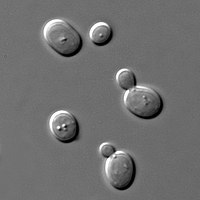
Photo from wikipedia
Abstract Barley malt and sloe are two raw materials used in the production of beer and pacharan (a Spanish spirit drink), respectively. These organic wastes have been used as substrate… Click to show full abstract
Abstract Barley malt and sloe are two raw materials used in the production of beer and pacharan (a Spanish spirit drink), respectively. These organic wastes have been used as substrate of anaerobic digestion to assess the effect of temperature (35 °C and 55 °C) and thermal pretreatment (80 °C for 1.5 h). Viable microbiological isolates have also been identified through metabolic tests and a kinetic model which includes biogas generation and volatile solids (VS) removal has been proposed. Temperature studies on barley malt yielded higher productivities at 55 °C (the ratio of produced biogas volume per VS consumed was 119% higher than that at 35 °C), but similar VS removal (0.9% less elimination at 55 °C). On the other hand, sloe digestion was more effective at 35 °C (biogas/VS-consumed ratio 252% higher than that at 55 °C), while VS elimination can be considered the same. Attending to the effect of thermal pretreatment on productivity, barley malt showed no improvement while sloe was enhanced (144% at 35 °C and 160% at 55 °C). Kinetic modelling fits to the experimental results, showing differences in maximum specific growth rate of biomass according with the temperature conditions. In all cases the adjustment was good (R 2 > 0.96). Microbiological characterization identified bacterial population, both strict and facultative anaerobes.
Journal Title: Chemical Engineering Journal
Year Published: 2018
Link to full text (if available)
Share on Social Media: Sign Up to like & get
recommendations!